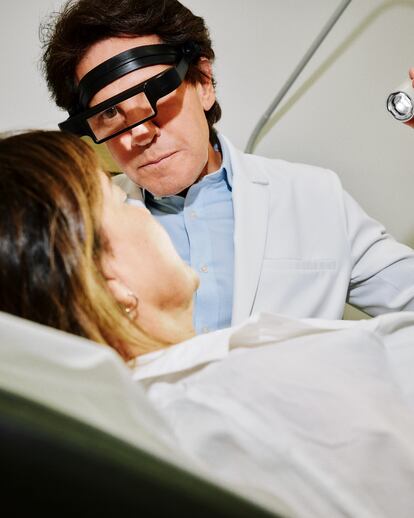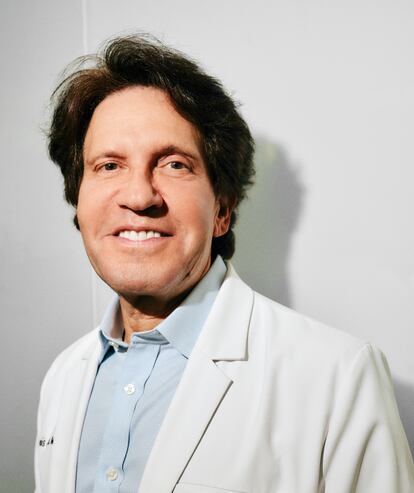Dennis Gross, celebrity dermatologist: ‘In the US we’ve gone too far with botox’
The rich and famous may fill his waiting room, but he is the real star. One of the most famous doctors in New York welcomes EL PAÍS to dismantle the myths and legends of skincare

Dr. Dennis Gross does not make categorical statements, nor does he have an answer for everything. He ponders each question for a long time. Then he examines the skin again in depth, in silence, and finally, when he speaks, he ends his sentences with an “it is possible,” or a “maybe,” or an uncertain “we would have to proceed carefully.” It is the rhythm of a dermatologist accustomed to the modern age of science and seasoned in the solitude of the laboratories at the Memorial Sloan Kettering Cancer Center, a prestigious research center in New York where he spent more than 20 years researching melanoma. In the early 2000s, with his wife Carrie Gross, he founded a brand bearing his name that has become one of the most recognized in the world. It is sold at Sephora and Nordstrom and has just been acquired by Japanese beauty giant Shiseido. Gross could retire tomorrow if he wanted to, but he continues to consult every day, and his Upper East Side and Hamptons offices have a long waiting list of illustrious names on it.
The story of Dr. Dennis Gross — the brand — begins in the late 1990s, a decade where exfoliating with abrasive chemical peels was the norm. After undergoing one of these treatments, the skin was red and irritated, shedding dead and even live cells. People had to stay at home for 72 hours before going out in public again. That dermal drama was the basis of skincare routines in the Manhattan of the 1990s and early 2000s. To make the procedure less traumatic, Dr. Gross experimented with new acids, reduced doses, and tried various mixtures until he achieved an equally effective but less aggressive peel that did not require the 72 hours of social isolation.

Carrie recalls that in 2002, shortly after the launch of the brand at Sephora, an episode of Sex and the City aired in which the character of Samantha Jones (played by Kim Cattrall) appears at a party with a veil covering her peel-scorched face. “We’re done,” Gross told her. But Carrie, seasoned in the world of marketing, thought otherwise: “Perfect timing! There was no other talk in Manhattan. Peels were the talk of the town,” she says from her husband’s office on the Upper East Side, near the Metropolitan Museum: a minimalist clinic, no frills, where Penélope Cruz or Emily Ratajkowski can show up at the door.
The success of his Alpha Beta Peel was immediate and his practice began to fill up, so much so that Carrie, then pregnant with twins, began to run out of time, and peels. As such the doctor created a gentler, safer version to apply at home. The new home peels, presented in two-phase single-dose sachets, democratized a procedure that was then limited to the elites.
One of Gross’ latest inventions is an LED light mask called DRx SpectraLite FaceWare Pro. It is not the only one on the market, but it is the first to win approval from the U.S. Food and Drug Administration. The mask is placed on the face and after three minutes it turns off automatically. If used daily, blemishes caused by acne disappear and wrinkles and other signs of aging improve.
When he speaks, Gross eschews excessive enthusiasm. Time, the right ingredients and consistency in care have the final say in his clinic. Genetics too, of course.

What’s the biggest lie in skin care?
Drinking collagen. It is a very heavy molecule. When it enters the digestive tract, the enzymes break it down and it doesn’t reach the skin; virtually all of it is eliminated. It’s a waste of money.
What about vitamin serums?
If the vitamins are bioidentical and safe, the appearance of the skin is going to improve, but a person with a balanced diet and normal nutrient absorption doesn’t need them. Many people feel better when they take vitamins intravenously. My wife loves them, for example. But I prefer to have a blood test to measure vitamin, iron and protein levels, and if everything is fine, nothing else is needed.
What do you think of the “vampire facelift” treatment?
I don’t like it. It basically consists of using a person’s plasma to fill out the skin and the result is very short-lived; sometimes the bruises last longer. There are alternatives.
Such as?
Well, there’s no point in drinking collagen, but there is a point in stimulating the skin to regenerate its own. This is what I believe in. As we age, three things happen to our skin: collagen degrades, the enzymes in the skin that break it down increase, and the cells that used to produce collagen become lazy and need to be stimulated. This can be achieved with vitamin C, alpha hydroxy acids, and technologies such as Thermage or Ultherapy, which have demonstrated the ability to stimulate fibroblasts to produce collagen again.
What is your favorite ingredient?
I love vitamin C. It regenerates collagen, helps with hyperpigmentation, and is a powerful antioxidant against free radicals from unprotected sun exposure. I also like retinol, which is not an antioxidant, but combines very well with vitamin C in a skin care routine.
How do you feel about Botox and fillers?
I really like it if you get natural results. My goal is for people to remain their freshest selves. I don’t want them to have a mouth they never had. In this country [the U.S.] we’ve gone too far and now we’re on the other side of the pendulum. Everybody is taking volume off.

What’s happening to the faces of people losing weight quickly with Ozempic?
It’s a problem. Sometimes you have to learn to live with a few extra pounds because those are the pounds that prevent gaunt faces. I have several patients here, actors and actresses, getting fillers to try to recover their pre-Ozempic face. They don’t succeed, because even if they regain the weight, that fat does not return to the exact place where it was. It is placed on the abdomen, on the legs, on the buttocks, and does not return to the face.
To paraphrase Nora Ephron, I don’t like my neck.
There are tricks, but it’s fighting gravity. Almost always the ultimate solution is a facelift.
If you had to choose, which procedure is worth investing in?
Procedures that regenerate your own collagen. I recommend taking an honest look in the mirror and asking yourself: “What is it that I dislike most?” The best investment will always be to improve that.
Do people still come to your practice with a picture of, say, Angelina Jolie, or are we more realistic these days?
Now they come in with a picture of themselves when they were 10 or 15 years younger, and that’s much better. It provides a lot of information and with good ingredients I’m able to tell them: let’s give it a try.
Sign up for our weekly newsletter to get more English-language news coverage from EL PAÍS USA Edition
Tu suscripción se está usando en otro dispositivo
¿Quieres añadir otro usuario a tu suscripción?
Si continúas leyendo en este dispositivo, no se podrá leer en el otro.
FlechaTu suscripción se está usando en otro dispositivo y solo puedes acceder a EL PAÍS desde un dispositivo a la vez.
Si quieres compartir tu cuenta, cambia tu suscripción a la modalidad Premium, así podrás añadir otro usuario. Cada uno accederá con su propia cuenta de email, lo que os permitirá personalizar vuestra experiencia en EL PAÍS.
¿Tienes una suscripción de empresa? Accede aquí para contratar más cuentas.
En el caso de no saber quién está usando tu cuenta, te recomendamos cambiar tu contraseña aquí.
Si decides continuar compartiendo tu cuenta, este mensaje se mostrará en tu dispositivo y en el de la otra persona que está usando tu cuenta de forma indefinida, afectando a tu experiencia de lectura. Puedes consultar aquí los términos y condiciones de la suscripción digital.









































